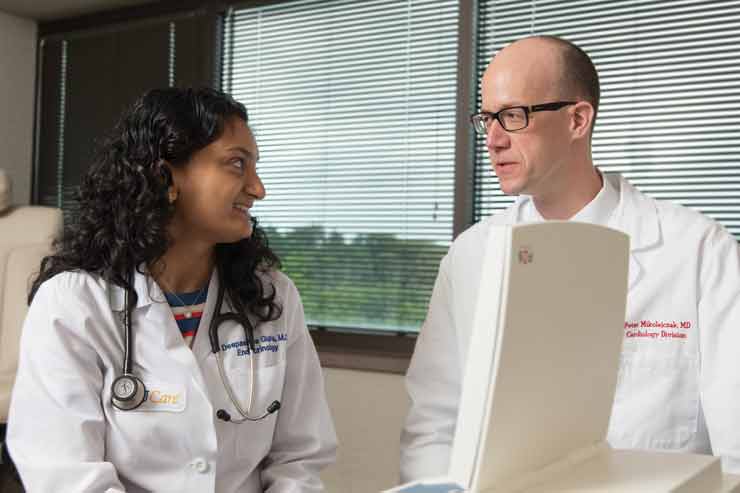We’ve all seen the commercial where the frail senior citizen cries, “Help me! I’ve fallen and I can’t get up!” One out of three adults age 65 or older falls each year, and falls are the leading cause of fatal and nonfatal injuries. More than 21,700 older Americans die annually from injuries suffered in falls. Others endure injuries, including hip fractures and head wounds, that make it difficult to live independently.
“About one in 10 people who fall might be surprised to learn they’re actually fainting,” says cardiologist/electrophysiologist Dr. Peter Mikolajczak of SLUCare, the physicians of Saint Louis University. An assistant professor of internal medicine at SLU, Mikolajczak is part of SLUCare’s Fainting and Falling Clinic at Des Peres Hospital. The clinic was established last year by Dr. John Morley, director of the divisions of geriatric medicine and endocrinology, diabetes and metabolism at SLU. Fainting, caused by decreased blood flow to the brain, occurs in older adults for a variety of reasons, Mikolajczak explains. A single fainting episode usually isn’t cause for alarm, he notes. “But repeated incidents could signal a serious underlying problem, including excessive medication, worsening vision, gait instability, exaggerated cardiovascular reflexes, cardiac arrhythmias, and dysfunction secondary to diabetes or Parkinson’s disease.”
With such a wide range of potential causes, many people end up seeing multiple doctors over a long period of time in a futile search for a diagnosis, Mikolajczak notes. “But the Fainting and Falling Clinic provides rapid, comprehensive diagnosis and treatment for people who have experienced unexplained blackouts, dizziness or falls,” he says. “Every person attending the clinic is evaluated jointly by a geriatrician, endocrinologist and cardiologist. Each patient undergoes a full range of appropriate diagnostic tests to determine the cause of their symptoms.”
Treatment depends on the underlying cause. “The most common cardiovascular cause of falls in the elderly is arrhythmia, resulting in slow or rapid heart rates,” Mikolajczak says. “We sometimes evaluate suspected arrhythmias by using heart monitors like the implantable loop recorder, a matchstick-sized computer injected beneath the skin. It allows us to record heart rhythm for up to three years, to see if patients are experiencing an arrhythmia when they fall.” Patients diagnosed with a dangerously slow heart rate caused by arrhythmia often benefit from a pacemaker to correct the abnormal rhythm, he adds.
Little kids fall all the time and don’t give it a second thought, but it’s different when people get older. “Blacking out and falling can result in loss of confidence, depression and a constant fear that makes seniors limit their activities,” Mikolajczak says. “So they lose mobility and physical fitness, increasing their risk of falling. It’s demoralizing and frustrating, especially if they don’t know what’s causing it. Often they don’t tell their loved ones about the falls, because they’re afraid they’ll be institutionalized. By offering early diagnosis and treatment, our clinic prevents subsequent injury—and helps seniors live as independently as possible.”
By Tony Di Martino
Photo: SLUCare
Pictured: Endocrinologist Dr. Deepashree Gupta and cardiologist Dr. Peter Mikolajczak of SLUCare’s Fainting and Falling Clinic
[SLUCare’s Fainting and Falling Clinic is located at Des Peres Hospital. For more information, call 314.977.4440 or visit slucare.edu/faintsfalls.]
